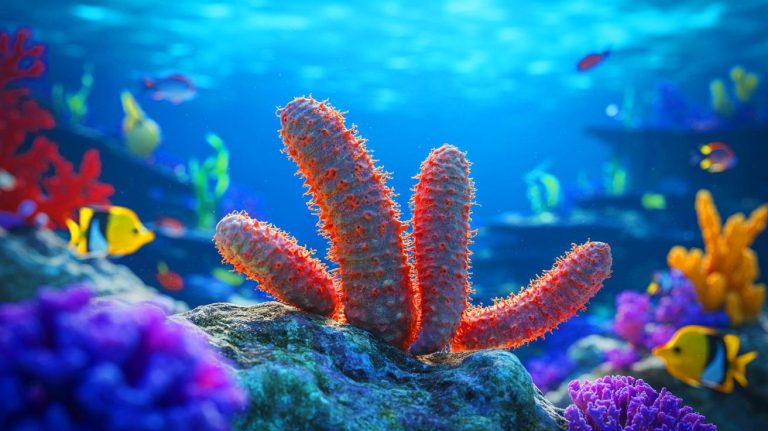| IN A NUTSHELL |
|
In the vast, unexplored depths of our oceans, marine life holds secrets that could revolutionize medical science. Among these mysteries, the humble sea cucumber emerges as a potential hero in the fight against cancer. Known for their role as nature’s janitors, these creatures possess unique compounds that could lead to safer, more effective cancer therapies. Recent research has uncovered a sugar compound within sea cucumbers that can inhibit enzymes linked to cancer progression, offering a promising new avenue for treatment without the risk of clotting, a common side effect of many existing therapies.
Seafloor Cleaners, Disease Fighters
The discovery of sea cucumbers’ potential as cancer fighters is rooted in their role as seafloor cleaners. As they sift through ocean sediments, they ingest and process organic material, making them invaluable to marine ecosystems. But their significance extends beyond their environmental role. The compounds found in sea cucumbers have unique structures not seen in terrestrial organisms, which makes them particularly interesting to researchers.
Researchers from the University of Mississippi and Georgetown University have identified a sugar compound in sea cucumbers that effectively blocks Sulf-2, an enzyme linked to cancer growth. Unlike other inhibitors, this compound does not interfere with blood clotting, a major advantage in cancer therapy. Inhibiting Sulf-2 could prevent the manipulation of glycans on cell surfaces, a process cancer cells use to spread. This makes sea cucumber compounds a safer alternative to current treatments, which often carry the risk of severe side effects like uncontrolled bleeding.
From Sushi to Science
Sea cucumbers are not just a potential medical marvel; they are also a culinary delicacy in many parts of the world. However, their limited abundance raises challenges for large-scale drug production. The next step for researchers is to synthesize the compound found in sea cucumbers for further study. This involves developing a chemical route to produce the compound in sufficient quantities for testing.
The synthesis of this compound is crucial because relying on natural harvesting could lead to ecological imbalances. By creating a synthetic version, researchers can ensure a sustainable and ethical approach to drug development. This not only preserves marine life but also provides a consistent supply for medical research and potential treatments.
The Science Behind the Discovery
The breakthrough in using sea cucumbers for cancer treatment stems from a combination of advanced scientific techniques. The research team employed mass spectrometry, biochemistry, enzyme inhibition, and computational modeling to understand how the sea cucumber sugar compound interacts with Sulf-2. This multidisciplinary approach allowed them to pinpoint the compound’s effectiveness in blocking the enzyme, paving the way for new cancer therapies.
Such comprehensive research demonstrates the power of collaboration across scientific fields. It underscores the importance of exploring marine life as a source of novel medical compounds. As our understanding of these creatures deepens, we uncover more about their potential to impact human health positively.
Marine-Based Therapies: The Future of Medicine?
The discovery of sea cucumbers’ cancer-fighting properties highlights the untapped potential of marine-based therapies. Unlike traditional drugs derived from animals, which can carry risks of viral transmission, marine sources offer a cleaner and potentially safer alternative. This could lead to a shift in how we approach drug development, focusing more on the ocean’s vast resources.
As researchers continue to explore the depths of our oceans, the hope is to find more marine organisms with similar or even more potent therapeutic compounds. This not only enhances our arsenal against diseases like cancer but also encourages sustainable practices in drug production. The ocean, with its vast biodiversity, may hold the key to overcoming some of humanity’s most challenging health issues.
The potential of sea cucumbers in cancer therapy opens a new chapter in medical science, promising safer, more effective treatments. As researchers work towards synthesizing these compounds, we are left to ponder: what other secrets does the ocean hold, and how can they transform the future of medicine?
Did you like it? 4.4/5 (26)






Wow, sea cucumbers are not just for sushi anymore! Who knew? 😄
This is fascinating! How soon can we expect these therapies to be available to patients?
Sea cucumbers to cure cancer? Sounds fishy to me… 🐟
Thanks for sharing this breakthrough! It’s amazing how much potential the ocean holds. 🌊
Does this mean sea cucumbers will become endangered if we start using them for medicine?
Great work! But how do we know the synthetic version will work as well as the natural compound?
Thank you for the enlightening article! This could be a game-changer in oncology.
Why sea cucumbers? Aren’t there other marine animals with similar properties?
Can we trust these compounds when they’re synthetically produced?
How sustainable is this approach if sea cucumbers are limited in abundance?
From the ocean to medicine cabinets, what a journey! 🌊💊
Are there any other diseases that sea cucumbers might help treat?
Will the synthetic version be as effective as the natural one found in sea cucumbers?
This is a huge step forward in cancer treatment. Thank you, scientists!
Do sea cucumbers have any other medicinal benefits?
Are there any ethical concerns with harvesting sea cucumbers for medical use?
So, does this mean sushi could be good for preventing cancer? 🍣
What are the challenges in developing the synthetic compound?
Sea cucumbers for cancer treatment? I hope they don’t taste like them too! 🤢
Can’t wait for more marine life discoveries! The ocean is truly amazing. 🌊
Is this method cost-effective compared to existing cancer treatments?
Sea cucumbers: Nature’s janitors and now cancer fighters. Incredible!
I’m curious how they discovered this compound. What inspired the research?
Does this mean we’ll see more marine life-inspired therapies in the future?
How does the sea cucumber compound compare to traditional cancer drugs?
Such an exciting development! When can we expect clinical trials to begin?
Thank you for this information! It’s inspiring to see nature contributing to medicine.
I wonder if this will reduce the cost of cancer treatments in the long run.
Will this discovery lead to more marine conservation efforts?